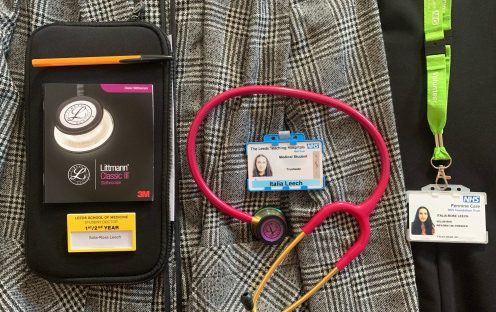What’s it like being a student doctor in the middle of a global pandemic?
- Student doctor reflects on disruption to studies and volunteeering during covid-19 crisis
NQ interviewed a student doctor on what it is like studying and working during a pandemic.
Italia Leech, 19, from Oldham is currently a first-year medicine student at Leeds University.
How has the Coronavirus pandemic directly affected you over the last two months?
“The pandemic has affected me massively as a medical student. I was sent home from university on 23 March with little information on what would be happening next, such as what would be happening regarding teaching and when or if I would even be returning this academic year.
“This has since been followed by a huge amount of emails which seemingly all contradict each other. As a medical student, this has meant that all teaching has restored to being online, making it harder to ask questions and gain the same level of interaction – for instance we can no longer attend dissection classes.
“This has been a big one for me as I chose this university based on the fact it was one of only a handful which still offered dissections. In addition to this, all clinical placements have been cancelled until further notice, leaving no other options for gaining our required clinical skills which we are still being assessed on in June.
“The pandemic has also meant that I’ve had to abruptly leave behind a lot of my belongings and not get to say goodbye to any friends, particularly friends that are international students who I will now not get to see until the next academic year.”

As a student doctor, do you feel an obligation to volunteer during these times?
“I personally feel there is a lot of pressure on medical students and other health care students to volunteer during this time, which is difficult as it is not feasible for everybody and depends on their home situation and any potential health conditions that the individual or their family members may be dealing with.
“There is also a huge amount of pressure coming from people judging you if you don’t volunteer to help during this pandemic, which raises the questions of ‘you’re a medical student so why aren’t you helping?’.
“I have personally chosen to volunteer at a hospice and pick up shifts to do my part but have since stopped due to my own health issues. I can see why people would feel obliged to help, especially if coming from a health care background, as there is a sense of feeling helpless and wanting to relieve the pressure your colleagues are under.
“This sense of obligation is arguably exacerbated by social media, which has in some instances made me feel guilty for not doing more, and for also stopping.”
What is the most rewarding part about volunteering in healthcare?
“As cliché as it sounds, the most rewarding part is making a difference. There is nothing better than having a positive impact on the patients you are supporting – even if it is just a smile, a thank you or a card.
“It is also nice to see how each healthcare professional comes together in time of need and is able to form a multidisciplinary team and work well together. I love volunteering and making a difference and it is definitely something I will continue to do throughout medical school.”
What are you doing in your spare time to help keep you positive and your mind off the situation?
“I have just picked up doing yoga and meditation as I have a lot more free time now with being home from university. I am also using this time to make sure I exercise everyday and get into a healthy routine, which is something I hope to keep up once everything is back to normal.
“This has really helped me set goals for myself and to keep organised, as well as having a positive impact mentally, physically and emotionally. Setting myself goals each day and ticking off everything on my to-do list is definitely keeping me going and maintaining a sense of normality.”


